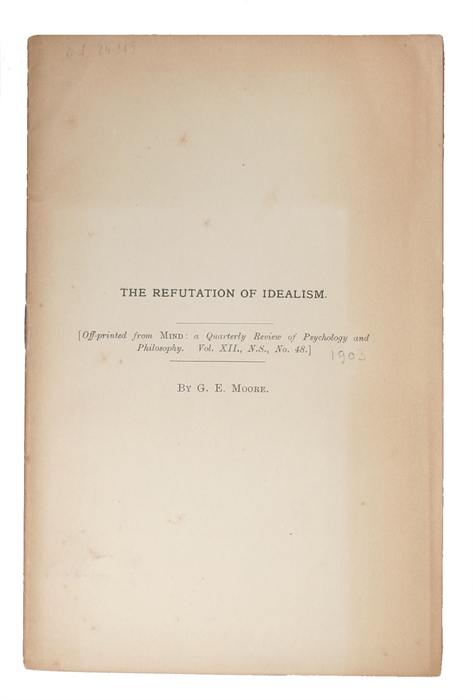THE FIRST CLASSIC TEXT OF REALISM - WITTGENSTEIN'S COPY
MOORE, G.E.
The Refutation of Idealism. [Off-printed from MIND: a Quaterly Review of Psychology and Philosophy. Vol. XII., N.S., No. 48.].
[Aberdeen Univ. Press Limited, 1903]. 8vo. In the orig. printed wrappers (part of the collation); wrapper with a bit of browning and minor brownspotting. 23 , (1) pp.
First edition, off-print - from the library of Wittgenstein -, of the first classic text of Realism, one of Moore's main works and a huge inspirational source for analytic philosophy.
Off-prints of the present work are of great scarcity, and the present copy has been in the possession of Ludwig Wittgenstein, who was probably given the copy by Moore himself. Wittgenstein handed over some of his belongings, including a number of his books, to his life-long friend Ludwig Hänsel. Among these belongings was the present copy of Moore's influential work.
Wittgenstein did not have many close friends, but the closest- together with Rudolph Koder- was Luwig Hänsel, who was a high-school teacher of German and literature. Hänsel and Wittgenstein, who befriended each other in 1918 while being war prisoners in Monte Casino, also remained close friends throughout their lives.
George Edward Moore (1873-1958) is one of the most influential of twentieth century philosophers, and his contributions to analytic philosophy can be compared to only those of Russell, Wittgenstein and Frege, with whom he founded this philosophical discipline. His impact on Anglo-American philosophy in the 20th century must be said to be nearly unsurpassed, and his "Refutation of Idealism" constitutes his most important, influential, and consequential criticism of idealism.
""The Refutation of Idealism" (1903) is the first classic text of Realism. Although ostensibly a refutation of the doctrine that "to be is to be perceived", which Moore took to be central in all arguments for the Idealist view that reality is spiritual, it is also a vindication of the common-sense notion that what is experienced is often distinct from and logically independent of our experience of it as well as a vindication of analysis as a method for discerning constituents of certain complexes in the world. Basic to Moore's refutation of Idealism is the rejection of the logical doctrine that all relations, including that of the object and subject of experience, are internal. Yellow and the sensation of yellow are not only distinct, but the latter also involves and external relation between consciousness which is mental and yellow which is not." (Morris Weitz, edt., 20th-Century Philosophy: The Analytic Tradition, 1966, p. 14).
For Wittgenstein, the question of idealism is absolutely central in most aspects of his philosophy, and this main work on the area must therefore have been of the utmost interest to him. When Wittgenstein claims that the limits of language are the limits of the world (the early Wittgenstein - Tractatus published 1921) and considers the possibility of private language (the later Wittgenstein - Philosophical Investigations - published 1953), it is continually idealism that is at stake, and the question of the idealism (or the refutation of idealism) in the works of Wittgenstein is a highly debated and often not agreed upon point. Wittgenstein must have read Moore's important work on the subject, before he wrote his own works, as it appeared many years earlier, and as he evidently had a copy of the off-print.
Order-nr.: 39973

